Wagner’s “The Rhinegold” at ENO
Musically, this is a fantastic evening, not to be missed. My personal jury, however, remains out as regards the production
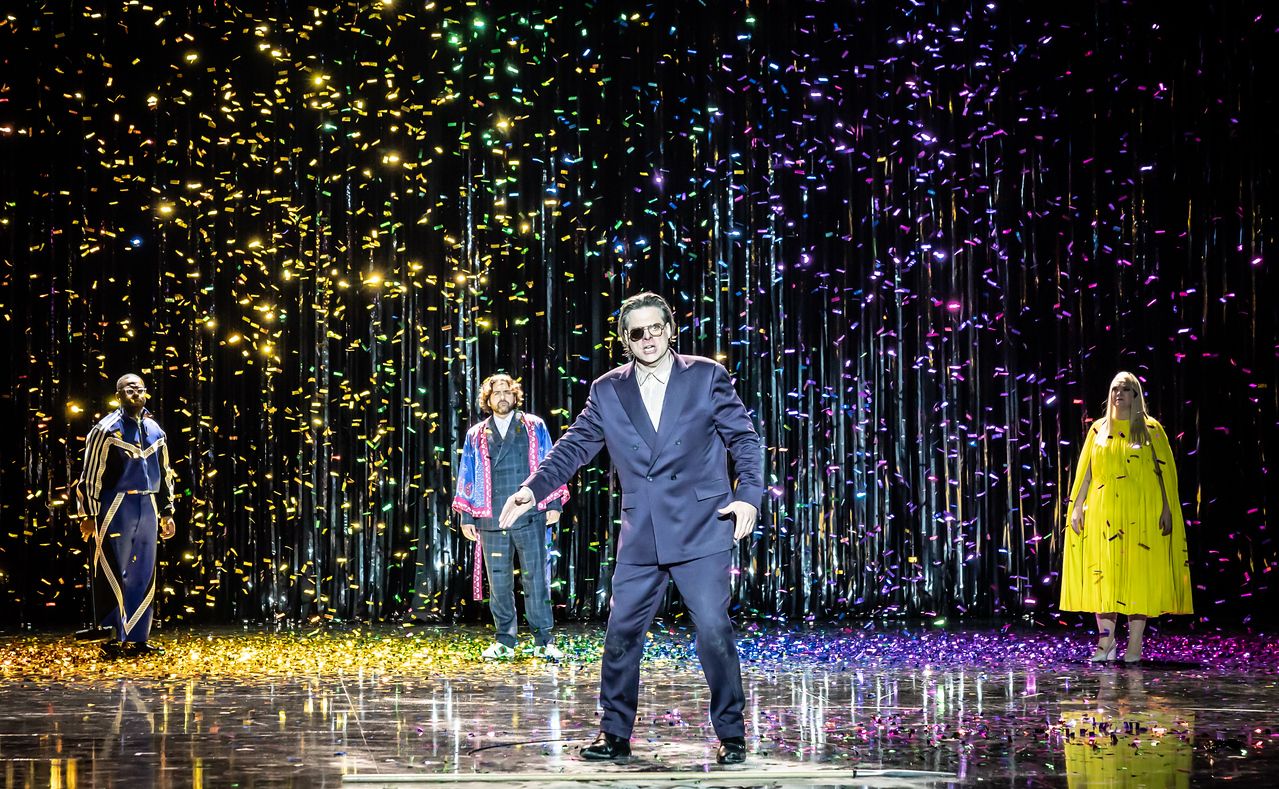
Wagner Das Rhinegold (in English, as The Rhinegold, transl. Deathridge). Cast; Orchestra of English National Opera / Martyn Brabbins. Coliseum, London, 18.02.2023
Production:
Richard Jones – Director
Stewart Laing – Designer
Adam Silverman – Lighting
Akhila Krishnan – Video
Sarah Fahie – Movement
Cast:
Woglinde – Eleanor Dennis
Wellgunde – Idunnu Münch
Flosshilde – Katie Stevenson
Alberich – Leigh Melrose
Mime – John Findon
Wotan – John Relyea
Fricka – Madeleine Shaw
Freia – Katie Lowe
Froh – Julian Hubbard
Donner – Blake Denson
Erda – Christine Rice
Fasolt – Simon Bailey
Fafner – James Creswell
After presenting the first day of the Ring, Die Walküre (or, in ENO’ hands, The Valkyrie), we have the Vorabend, Das Rheingold, a ‘preludial evening’ which, in its four scenes – no interval here – sets the stall for the three ‘days’ that follow. An odd inversion in itself, but we should be grateful that ENO’s Rhinegold is here at all. And it was so heart-warming to see such a full theatre, and to hear the cheers at the end, particularly (and deservedly) for the orchestra and its conductor, Martyn Brabbins.
But first, the staging. There is plenty to deconstruct here. It is an entertaining evening – a chap in the row behind us thought much of it hilarious judging by the guffaws – but is the deliberate cheapness in Richard Jones’ staging a cheapening of Wagner? The great Meister (that's Wagner) is mining the ancient Edda, after all, ancient tales that speak more to our subconscious, to Mankind’s collective memory. They are timeless for a reason; as is Wagner’s take. The political shenanigans and greed seem all too relevant today. Wagner’s scores have been the fuel of a multitude of directorial approaches, and this one is particularly rife with ideas, almost too much so.
Here, the gold is initially shown as a Golden Baby marionette doll – shades, surely, of Stephen Langridge’s Gothenburg eco-Ring, where a Golden Child (there actually played by a real person tightly clad all in gold) was a vital part of his conception?. Here, we see the gold reduced to a ring in a process that seems the inverse of what we see at the opening – an opening where a naked man drags a piece of tree (the World Ash, presumably) on and off stage, appearing initially stark-bollock naked and gradually adding layers. Only then do we hear the chthonic opening – surely the beginning of Time itself? So is this pre-temporal?
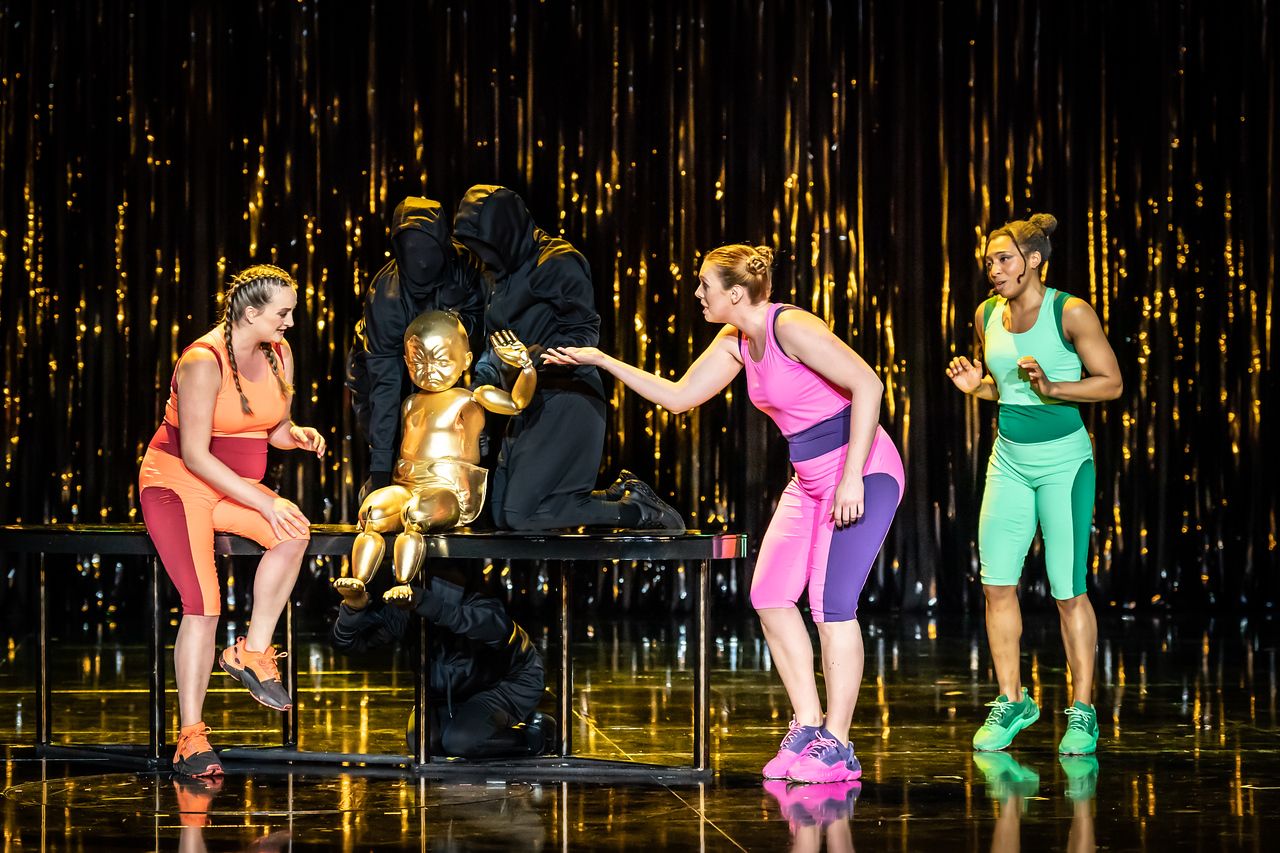
There is no doubt ideas tumble over one another in this staging. Clouds look like models of molecules (or a reference to genetics, perhaps?); a reflective, glittery taffeta-like curtain speaks of Soho strip clubs of old (so I’m told … ).
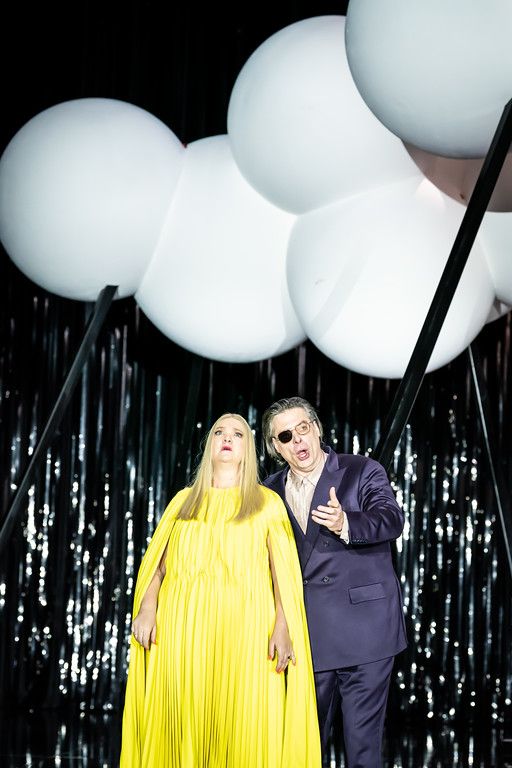
We see Norns, a premature surprise, dressed as schoolgirls, Rhinemaidens as gym bunnies, Erda in pink pyjamas, Freia in a scarily yellow dress and boiler-suited near-identical giants (Fasolt and Fafner). A troupe of black-clad figures seem to watch and even direct characters’ actions. Mime is beaten not by Alberich, but by Alberichs, very much in the plural, in a brutal gang beating that invokes The Matrix films. A final surprise – the shimmering curtain allows the Gods and Goddesses to enter into a Valhalla that is more prison than Heavenly stronghold. A door with a huge lock keeps out the Rhinemaidens, who pound on the windows, which are closed one by one. Wotan and his troupe’s arrival feels (rightly) hollow.
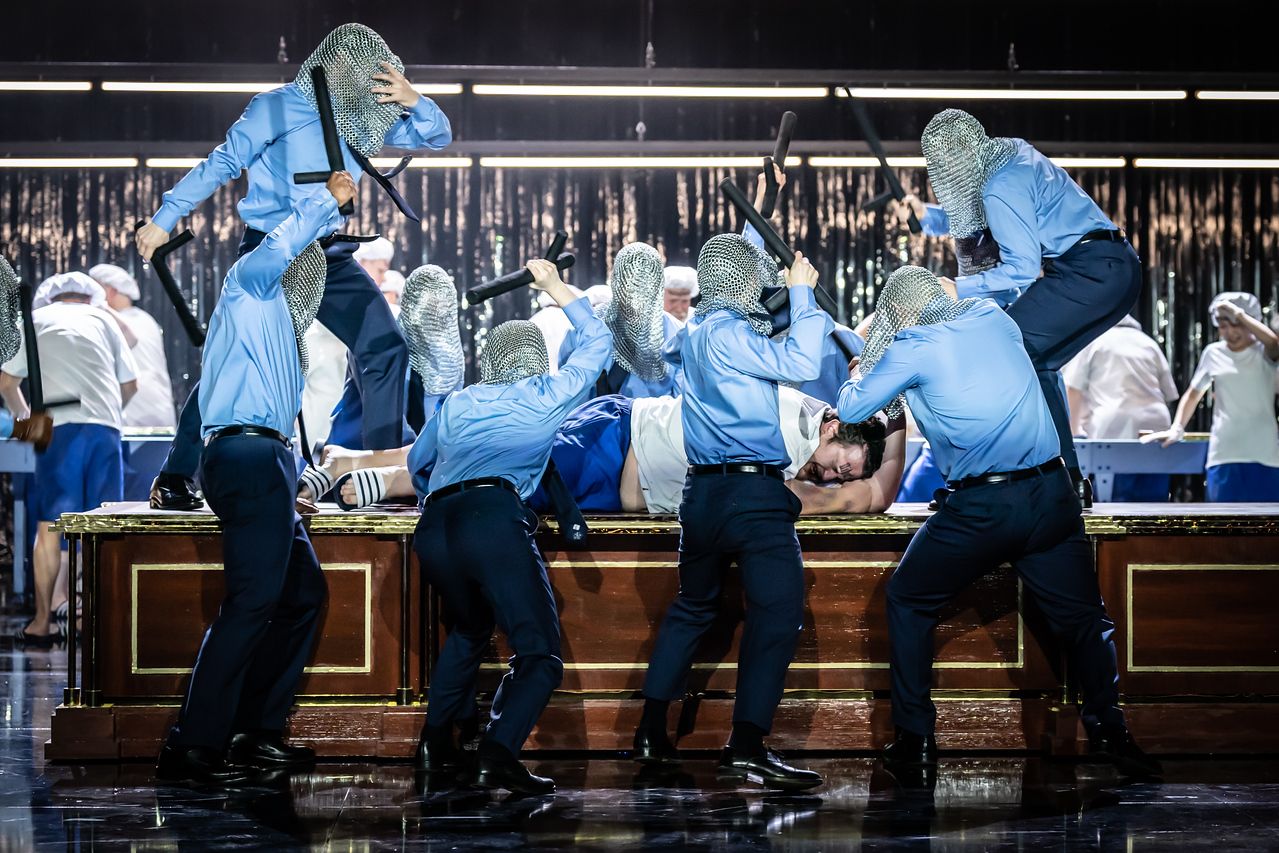
It is, though, a stroke of genius to have Fasolt and Fafner as near-doubles, both initially dressed in workmans’s boiler suits after their labour; later, a truck is driven onto the stage to receive the gold. However, the transformations effected in the story via the Tarnhelm (which appears to be mouldable chainmail) are again surely deliberately comic book, particularly the dragon costume Alberich wears. One wonders how Siegfried will emerge; and whether the golden baby will return in ‘human/doll’ form in Götterdämmerung? We will have to wait and see, of course,
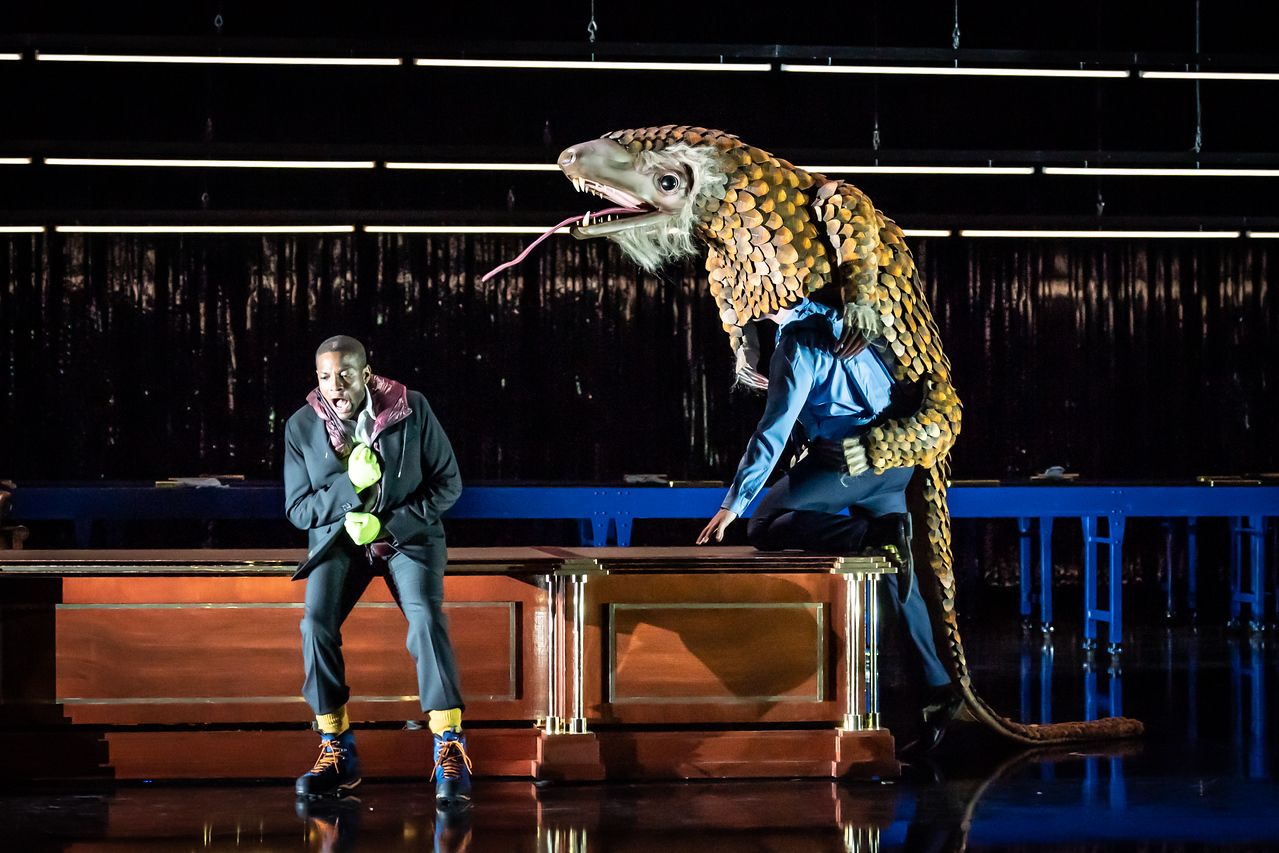
There are video components here (Akhila Krishnan), but they are few and underwhelming – bars that move across the stage, ribbons of colour. All of which makes one wonder if it is worth going. It is, but for (most of) the singing and certainly for the glowing ENO orchestra. Brabbins paces the work brilliantly, with few drops in tension. The orchestra is huge - harps appear in an audience box to the left (there was a nice pre-show rehearsal for those of us who took our seats early), percussion in one to the right. From the quietest pianissimo to the most frightening of shrieks in Nibelheim, the ENO band is on fire. Watching Brabbins, it is clear he knows every note of the score intimately, and communicates his interpretation viscerally to his players. Some woodwind solos were ravishing (the oboe in particular, when the gods fade with the loss ofthe power of the Golden Apples after Freia’s abduction by the giants), the brass ringing and resplendent, while the strings played with a unanimity I remember only rarely encountering at St Martin's Lane. How palpably the orchestra slithered as Wotan and Loge descended into Nibelheim; how powerfully they acclaimed Valhalla, how brilliantly they invoked the Rhine.
So to the singers. Who to begin? The Wotan? The Fricka? No: credit where credit is due, Blake Denson’s Donner was magnificent. He took a character who really has only one big moment (at the very end) and gave him depth and power. Power, certainly, in vocal terms, but Denson has real stage presence too.
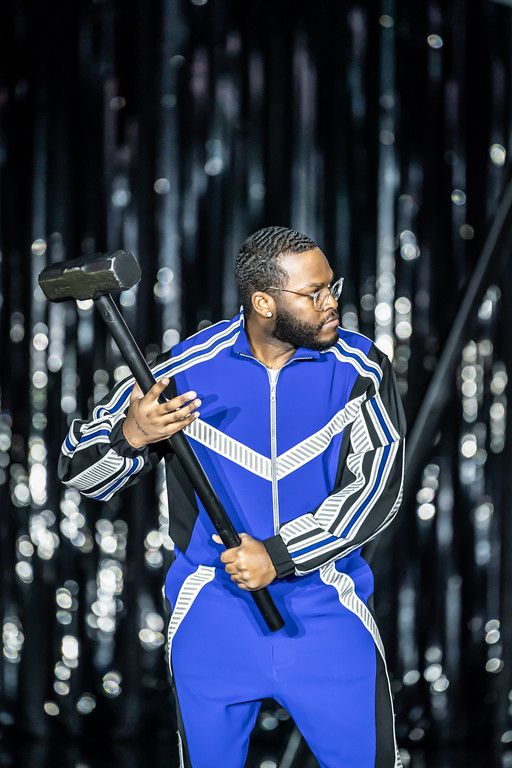
The Canadian bass-baritone John Relyea, making his ENO debut, was a fine, strong Wotan, authoritative and confident.
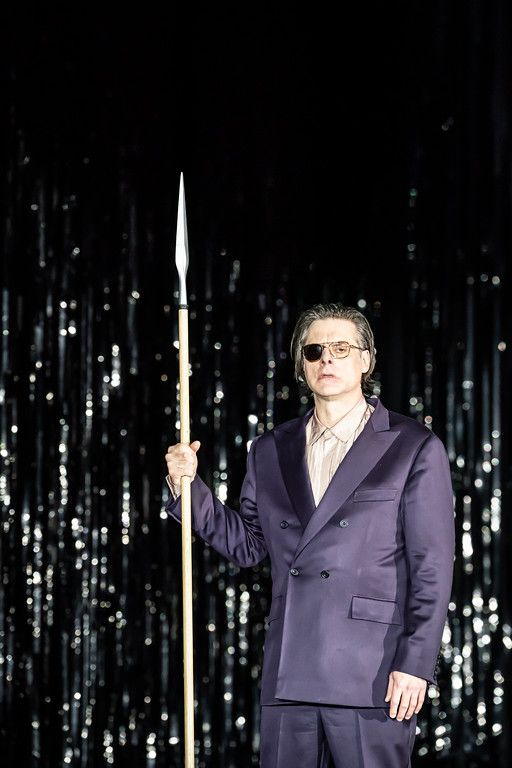
Wonderful to see Christine Rice as an all-knowing Erda, deeply wise despite her pyjamas (!), and also deeply resonant of voice. The pairing of Alberich and Mime was, like that of the giants, finely judged, with John Findon brilliant as the put-upon Mime and Leigh Melrose as a deliciously crazed, power-mad Alberich - Melrose was totally convincing. We believed his lust for the Rhinemaidens as much as we believed his denunciation of Love and, later, his Curse, his C-Major arpeggiation powerfully delivered against the timpani’s tritonaly-distantl pedal F sharp.
While Frederick Balantine was a nicely un-clichéd Loge, the demi-god who accompanies Wotan to Nibelheim and who comments on the gods’ foolhardiness at the evening’s close, he had big shoes to fill after James Schouten’s awe-inspiring assumption of the role for Regent’s Opera over at the Grand Temple of Freemasons Hall recently (November 2022); in the final analysis, Schouten’s reading was more compelling. If Madeleine Shaw’s Fricka was sometimes a touch shrill, but her question to Wotan at the close (asking what the name Valhalla means) made its mark straight and true, Katie Lowe made a fine fist of the deliberately girlish Freia. Both of the giants, Simon Bailey and James Creswell, were impeccable in their personification of greed and lust (in this staging, Freia seems unwilling to leave them), while Julian Hunnard was a fine, fresh-voiced, strong Froh.
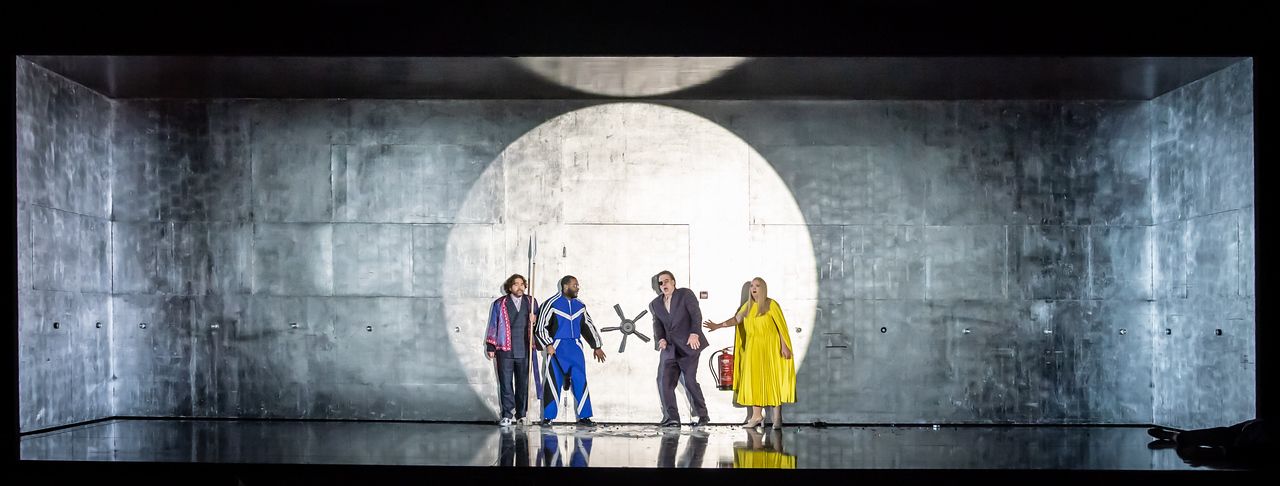
Two of the three Rhinemaidens are ex-ENO Harewood Artists (formerly known as the ENO Jerwood Young Singers Programme): Eleanor Dennis and Katie Stevenson, and the remaining maiden (Idunnu Münch) is a current ENO Harewood Artist. They were a riot, funny in their taunting of Alberich and well-matched vocally.
Adam Silverman’s lighting is particularly well done, and one cannot fault the superb nature of Stewart Laing’s designs, even as one questions the overall basic conception.
Musically, this is a fantastic evening, not to be missed. My personal jury, however, remains out as regards the production.
Aeking which Rheingold (let’s revert to the German, what I recommend is destined to be sung in the orignal language!) is the best to buy is an impossible question. Here is a classic, Solti’s Vienna performance with an all-star cast. Not all Wagnerians approve of Solti as he can appear to focus on the big moments too much, but here we in the YouTube link above, have a score to follow and, in the comments, someone has put in timing points for the various Leitmotifs used by Wagner (to be very somple in definition, recurring themes that are associated with either people, situations or objects).
Talking of all-star casts, the Amazon link below is to Testament’s epoch-making release of the Rheingold from the 1955 Bayreuth Festival, conducted by Keilberth with a cast including Hans Hotter and Gustav Neidlinger. I confess a weakness for the Bayreuth performance two years earlier under Clemens Krauss again with Hotter and Neidlinger, available as part of a complete Ring on Orfeo, sadly currently available; but if a second copy does appear on Amazon, it would do so here.
All photos in this post, including the header which appears on Twitter (@classicalexplo1), © Marc Brenner.
